Knowledge Management and E-Learning: Sourcing Knowledge Report
VerifiedAdded on 2023/04/22
|11
|2297
|230
Report
AI Summary
This report analyzes a research paper focusing on knowledge management and e-learning, specifically examining knowledge sourcing within project teams. The paper investigates how knowledge sourcing motivates team members and enhances knowledge reuse and creation. The report reviews the paper's introduction, which highlights the significance of knowledge management in business environments and the relation between knowledge and motivation. It then delves into the paper's review of the research, which involved surveying project teams from French Business Schools to understand their performance outcomes. The report critically analyzes the paper's methodology, findings, and limitations, including the use of self-reported measures and the need for more in-depth explorations. The report highlights the importance of internet and e-learning as tools for knowledge creation and the impact of group knowledge sourcing on team performance. It concludes by emphasizing the value of the research findings while acknowledging the need for further research to overcome limitations and provide more comprehensive results, including the use of various research techniques and separate secondary and primary observations to improve the quality of data and analysis.
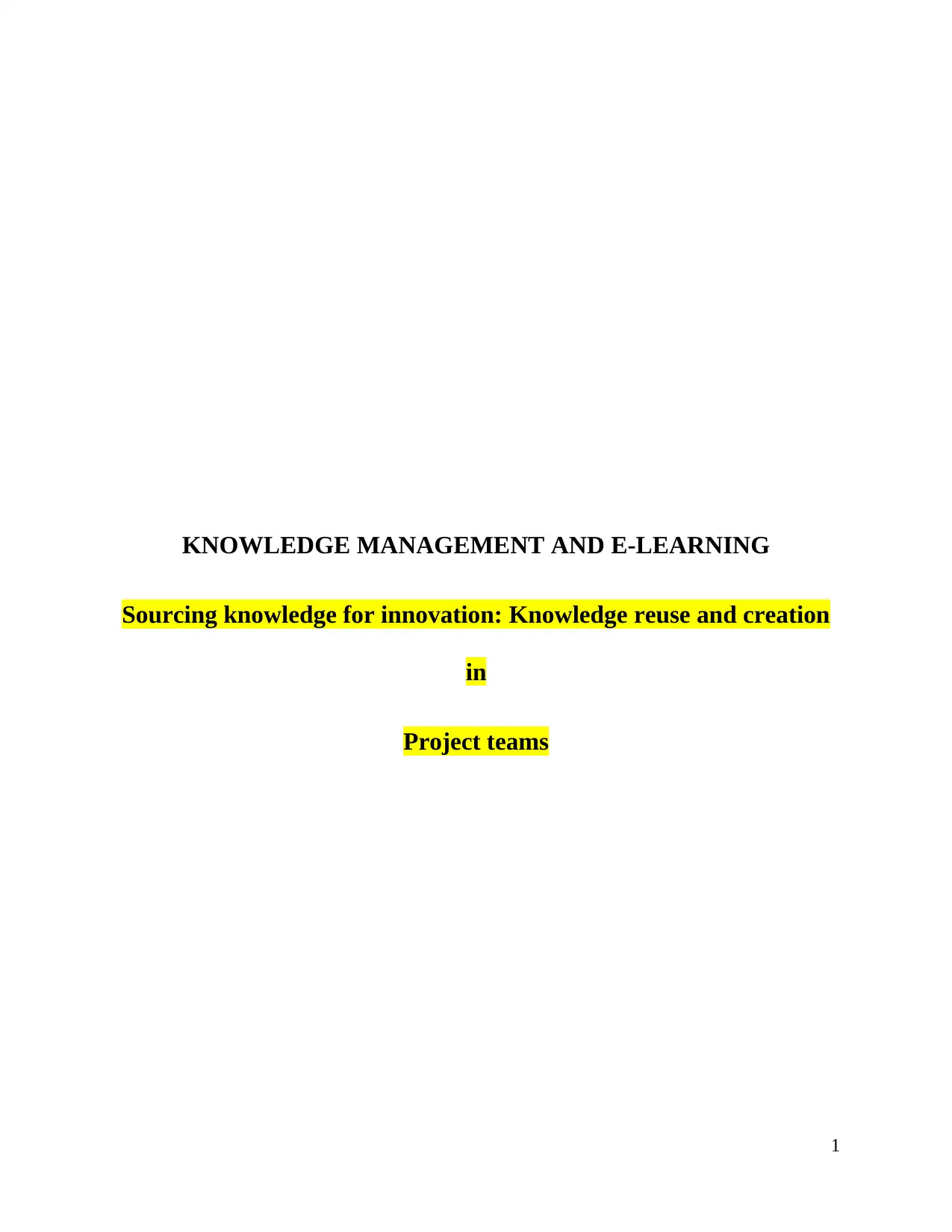
KNOWLEDGE MANAGEMENT AND E-LEARNING
Sourcing knowledge for innovation: Knowledge reuse and creation
in
Project teams
1
Sourcing knowledge for innovation: Knowledge reuse and creation
in
Project teams
1
Paraphrase This Document
Need a fresh take? Get an instant paraphrase of this document with our AI Paraphraser
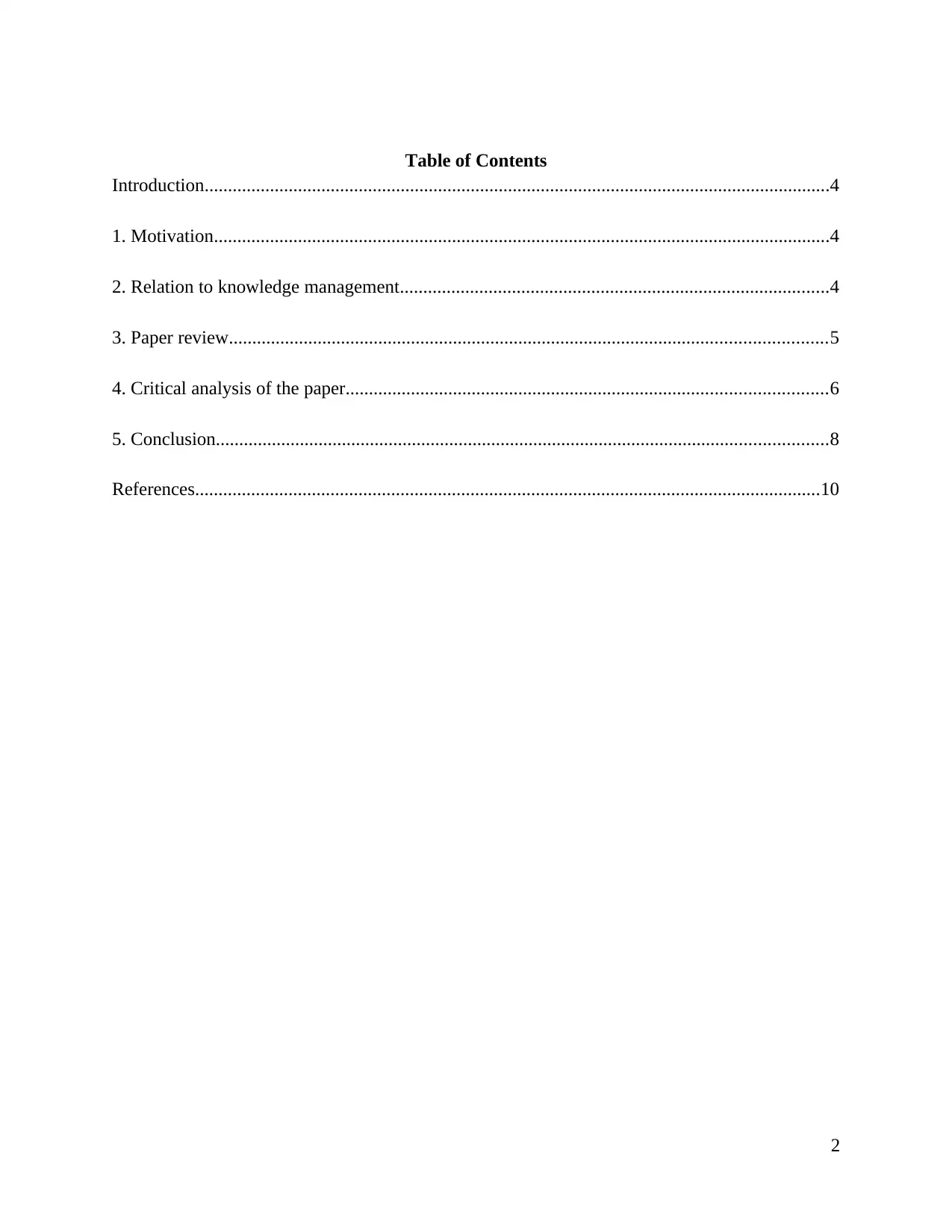
Table of Contents
Introduction......................................................................................................................................4
1. Motivation....................................................................................................................................4
2. Relation to knowledge management............................................................................................4
3. Paper review................................................................................................................................5
4. Critical analysis of the paper.......................................................................................................6
5. Conclusion...................................................................................................................................8
References......................................................................................................................................10
2
Introduction......................................................................................................................................4
1. Motivation....................................................................................................................................4
2. Relation to knowledge management............................................................................................4
3. Paper review................................................................................................................................5
4. Critical analysis of the paper.......................................................................................................6
5. Conclusion...................................................................................................................................8
References......................................................................................................................................10
2
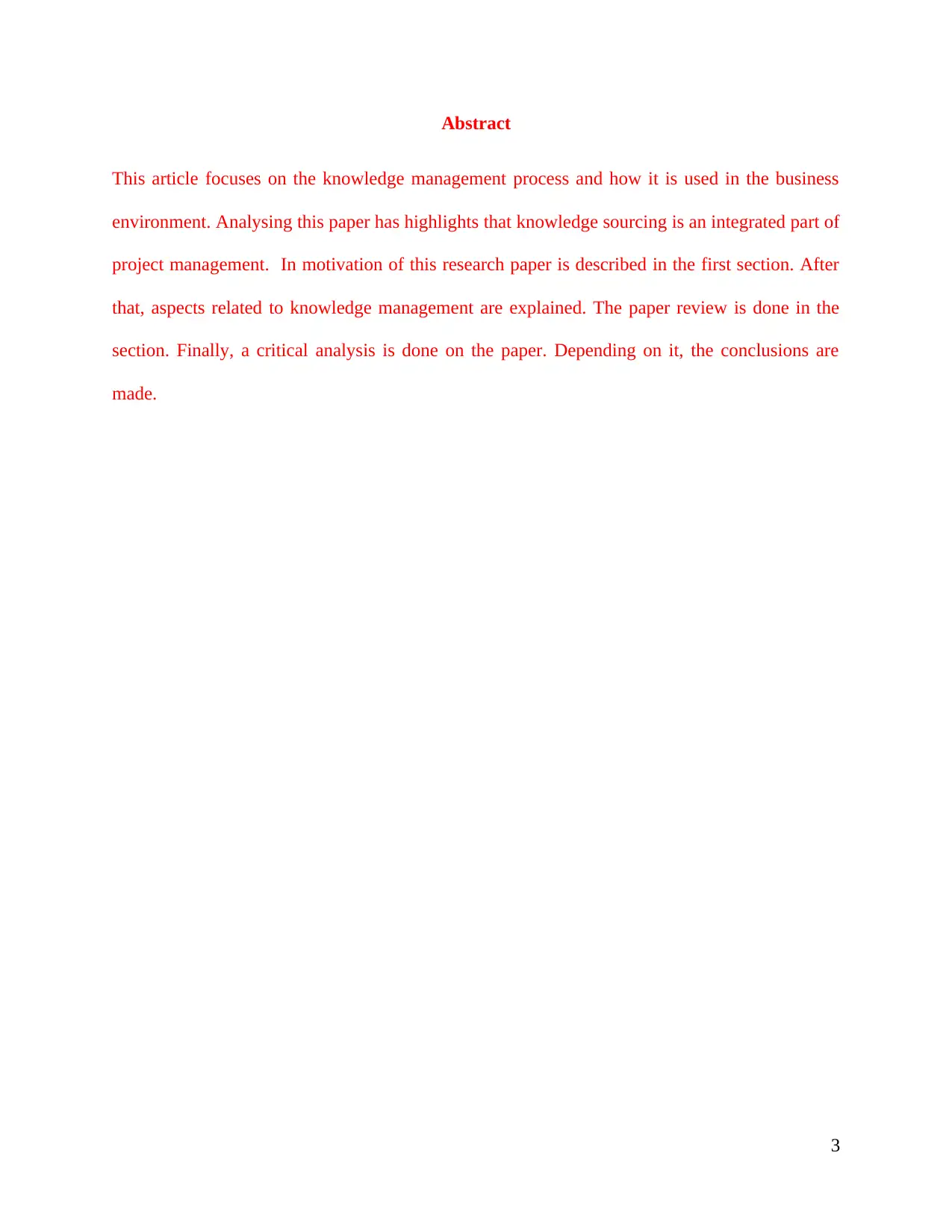
Abstract
This article focuses on the knowledge management process and how it is used in the business
environment. Analysing this paper has highlights that knowledge sourcing is an integrated part of
project management. In motivation of this research paper is described in the first section. After
that, aspects related to knowledge management are explained. The paper review is done in the
section. Finally, a critical analysis is done on the paper. Depending on it, the conclusions are
made.
3
This article focuses on the knowledge management process and how it is used in the business
environment. Analysing this paper has highlights that knowledge sourcing is an integrated part of
project management. In motivation of this research paper is described in the first section. After
that, aspects related to knowledge management are explained. The paper review is done in the
section. Finally, a critical analysis is done on the paper. Depending on it, the conclusions are
made.
3
⊘ This is a preview!⊘
Do you want full access?
Subscribe today to unlock all pages.

Trusted by 1+ million students worldwide
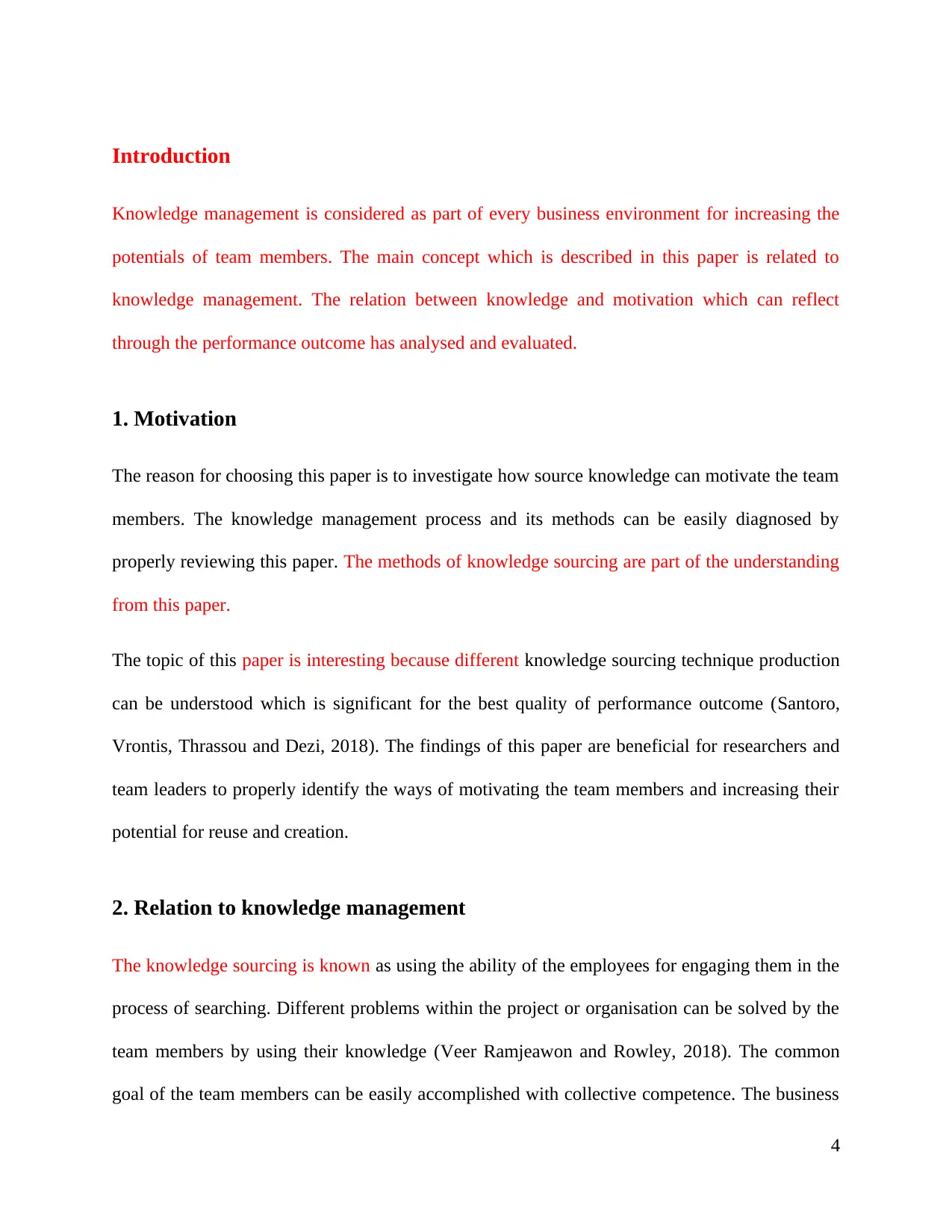
Introduction
Knowledge management is considered as part of every business environment for increasing the
potentials of team members. The main concept which is described in this paper is related to
knowledge management. The relation between knowledge and motivation which can reflect
through the performance outcome has analysed and evaluated.
1. Motivation
The reason for choosing this paper is to investigate how source knowledge can motivate the team
members. The knowledge management process and its methods can be easily diagnosed by
properly reviewing this paper. The methods of knowledge sourcing are part of the understanding
from this paper.
The topic of this paper is interesting because different knowledge sourcing technique production
can be understood which is significant for the best quality of performance outcome (Santoro,
Vrontis, Thrassou and Dezi, 2018). The findings of this paper are beneficial for researchers and
team leaders to properly identify the ways of motivating the team members and increasing their
potential for reuse and creation.
2. Relation to knowledge management
The knowledge sourcing is known as using the ability of the employees for engaging them in the
process of searching. Different problems within the project or organisation can be solved by the
team members by using their knowledge (Veer Ramjeawon and Rowley, 2018). The common
goal of the team members can be easily accomplished with collective competence. The business
4
Knowledge management is considered as part of every business environment for increasing the
potentials of team members. The main concept which is described in this paper is related to
knowledge management. The relation between knowledge and motivation which can reflect
through the performance outcome has analysed and evaluated.
1. Motivation
The reason for choosing this paper is to investigate how source knowledge can motivate the team
members. The knowledge management process and its methods can be easily diagnosed by
properly reviewing this paper. The methods of knowledge sourcing are part of the understanding
from this paper.
The topic of this paper is interesting because different knowledge sourcing technique production
can be understood which is significant for the best quality of performance outcome (Santoro,
Vrontis, Thrassou and Dezi, 2018). The findings of this paper are beneficial for researchers and
team leaders to properly identify the ways of motivating the team members and increasing their
potential for reuse and creation.
2. Relation to knowledge management
The knowledge sourcing is known as using the ability of the employees for engaging them in the
process of searching. Different problems within the project or organisation can be solved by the
team members by using their knowledge (Veer Ramjeawon and Rowley, 2018). The common
goal of the team members can be easily accomplished with collective competence. The business
4
Paraphrase This Document
Need a fresh take? Get an instant paraphrase of this document with our AI Paraphraser
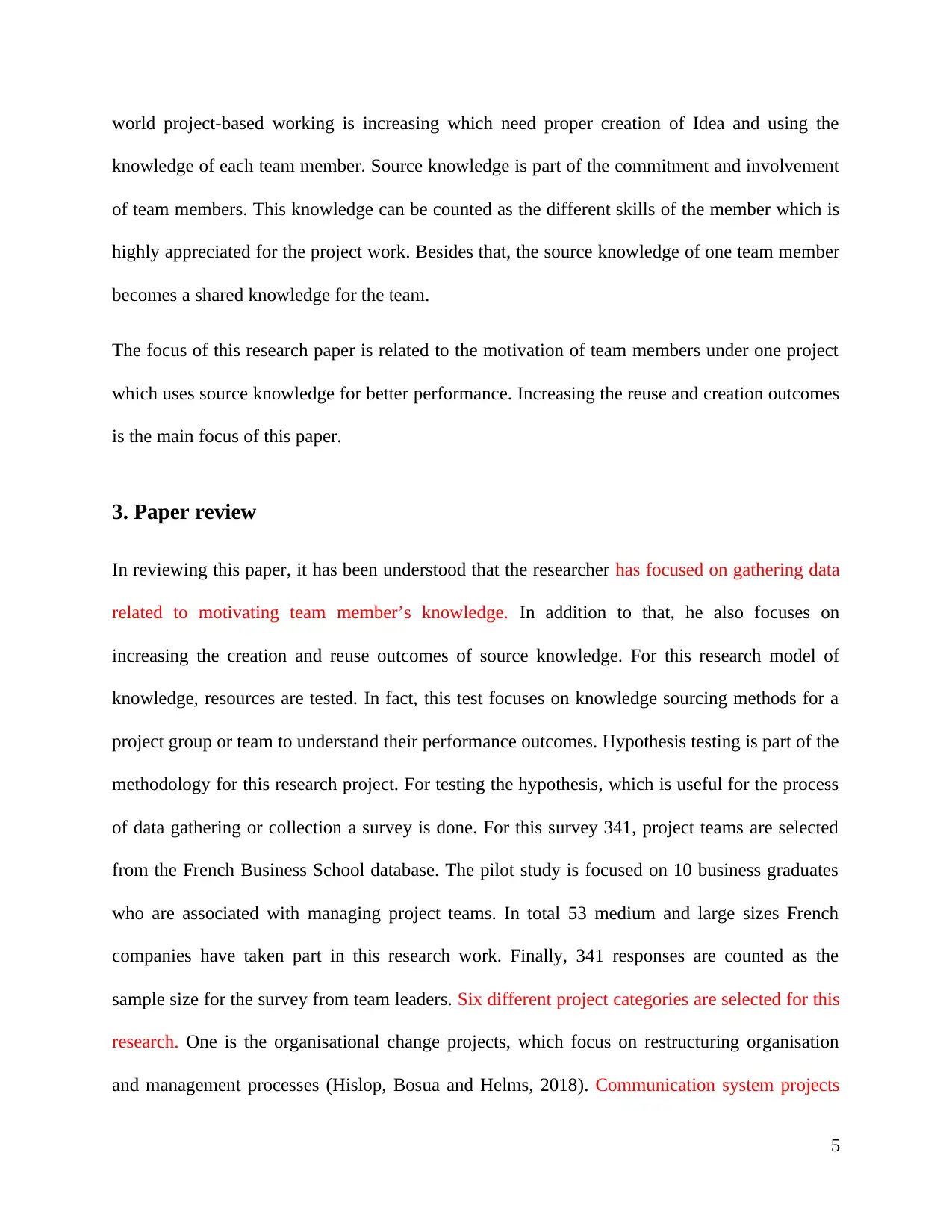
world project-based working is increasing which need proper creation of Idea and using the
knowledge of each team member. Source knowledge is part of the commitment and involvement
of team members. This knowledge can be counted as the different skills of the member which is
highly appreciated for the project work. Besides that, the source knowledge of one team member
becomes a shared knowledge for the team.
The focus of this research paper is related to the motivation of team members under one project
which uses source knowledge for better performance. Increasing the reuse and creation outcomes
is the main focus of this paper.
3. Paper review
In reviewing this paper, it has been understood that the researcher has focused on gathering data
related to motivating team member’s knowledge. In addition to that, he also focuses on
increasing the creation and reuse outcomes of source knowledge. For this research model of
knowledge, resources are tested. In fact, this test focuses on knowledge sourcing methods for a
project group or team to understand their performance outcomes. Hypothesis testing is part of the
methodology for this research project. For testing the hypothesis, which is useful for the process
of data gathering or collection a survey is done. For this survey 341, project teams are selected
from the French Business School database. The pilot study is focused on 10 business graduates
who are associated with managing project teams. In total 53 medium and large sizes French
companies have taken part in this research work. Finally, 341 responses are counted as the
sample size for the survey from team leaders. Six different project categories are selected for this
research. One is the organisational change projects, which focus on restructuring organisation
and management processes (Hislop, Bosua and Helms, 2018). Communication system projects
5
knowledge of each team member. Source knowledge is part of the commitment and involvement
of team members. This knowledge can be counted as the different skills of the member which is
highly appreciated for the project work. Besides that, the source knowledge of one team member
becomes a shared knowledge for the team.
The focus of this research paper is related to the motivation of team members under one project
which uses source knowledge for better performance. Increasing the reuse and creation outcomes
is the main focus of this paper.
3. Paper review
In reviewing this paper, it has been understood that the researcher has focused on gathering data
related to motivating team member’s knowledge. In addition to that, he also focuses on
increasing the creation and reuse outcomes of source knowledge. For this research model of
knowledge, resources are tested. In fact, this test focuses on knowledge sourcing methods for a
project group or team to understand their performance outcomes. Hypothesis testing is part of the
methodology for this research project. For testing the hypothesis, which is useful for the process
of data gathering or collection a survey is done. For this survey 341, project teams are selected
from the French Business School database. The pilot study is focused on 10 business graduates
who are associated with managing project teams. In total 53 medium and large sizes French
companies have taken part in this research work. Finally, 341 responses are counted as the
sample size for the survey from team leaders. Six different project categories are selected for this
research. One is the organisational change projects, which focus on restructuring organisation
and management processes (Hislop, Bosua and Helms, 2018). Communication system projects
5
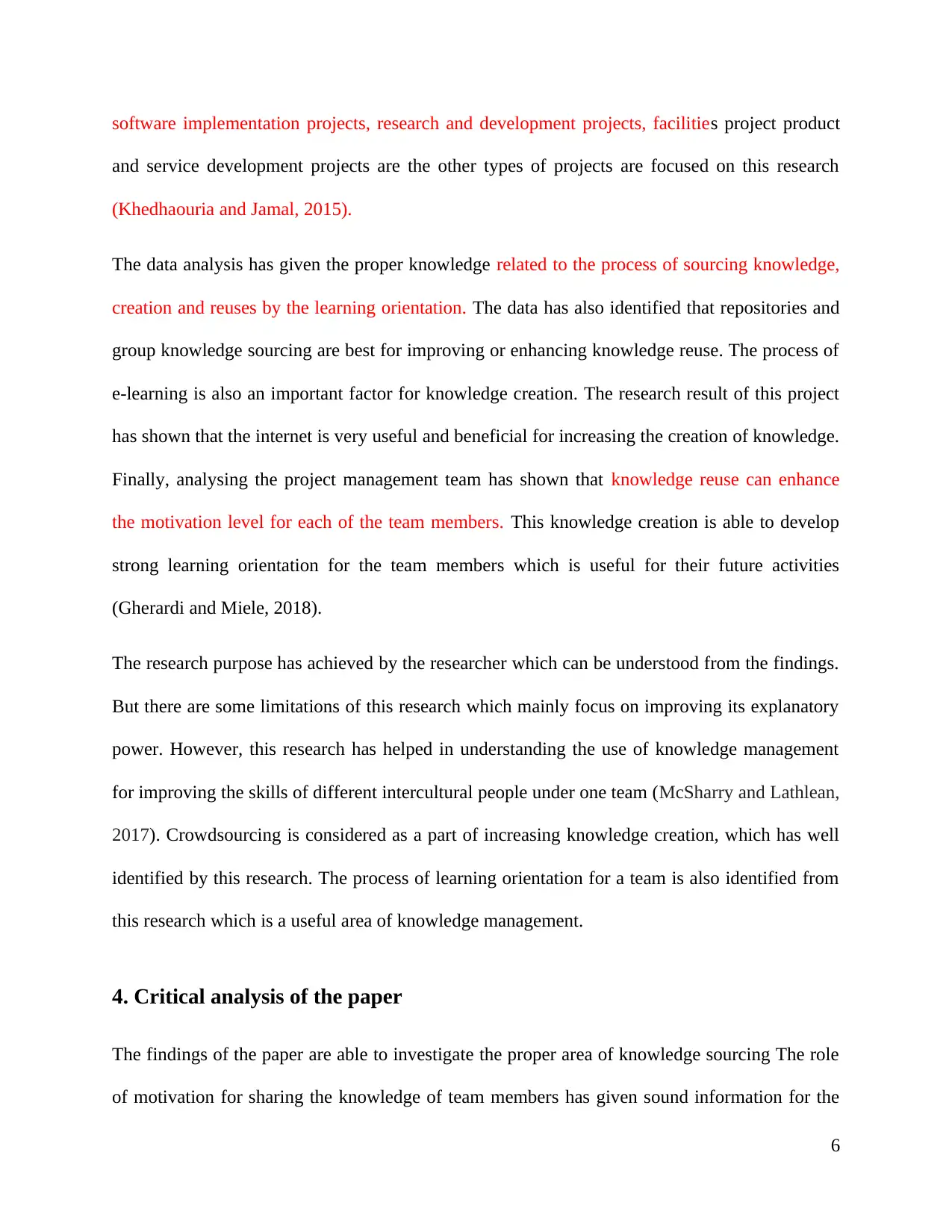
software implementation projects, research and development projects, facilities project product
and service development projects are the other types of projects are focused on this research
(Khedhaouria and Jamal, 2015).
The data analysis has given the proper knowledge related to the process of sourcing knowledge,
creation and reuses by the learning orientation. The data has also identified that repositories and
group knowledge sourcing are best for improving or enhancing knowledge reuse. The process of
e-learning is also an important factor for knowledge creation. The research result of this project
has shown that the internet is very useful and beneficial for increasing the creation of knowledge.
Finally, analysing the project management team has shown that knowledge reuse can enhance
the motivation level for each of the team members. This knowledge creation is able to develop
strong learning orientation for the team members which is useful for their future activities
(Gherardi and Miele, 2018).
The research purpose has achieved by the researcher which can be understood from the findings.
But there are some limitations of this research which mainly focus on improving its explanatory
power. However, this research has helped in understanding the use of knowledge management
for improving the skills of different intercultural people under one team (McSharry and Lathlean,
2017). Crowdsourcing is considered as a part of increasing knowledge creation, which has well
identified by this research. The process of learning orientation for a team is also identified from
this research which is a useful area of knowledge management.
4. Critical analysis of the paper
The findings of the paper are able to investigate the proper area of knowledge sourcing The role
of motivation for sharing the knowledge of team members has given sound information for the
6
and service development projects are the other types of projects are focused on this research
(Khedhaouria and Jamal, 2015).
The data analysis has given the proper knowledge related to the process of sourcing knowledge,
creation and reuses by the learning orientation. The data has also identified that repositories and
group knowledge sourcing are best for improving or enhancing knowledge reuse. The process of
e-learning is also an important factor for knowledge creation. The research result of this project
has shown that the internet is very useful and beneficial for increasing the creation of knowledge.
Finally, analysing the project management team has shown that knowledge reuse can enhance
the motivation level for each of the team members. This knowledge creation is able to develop
strong learning orientation for the team members which is useful for their future activities
(Gherardi and Miele, 2018).
The research purpose has achieved by the researcher which can be understood from the findings.
But there are some limitations of this research which mainly focus on improving its explanatory
power. However, this research has helped in understanding the use of knowledge management
for improving the skills of different intercultural people under one team (McSharry and Lathlean,
2017). Crowdsourcing is considered as a part of increasing knowledge creation, which has well
identified by this research. The process of learning orientation for a team is also identified from
this research which is a useful area of knowledge management.
4. Critical analysis of the paper
The findings of the paper are able to investigate the proper area of knowledge sourcing The role
of motivation for sharing the knowledge of team members has given sound information for the
6
⊘ This is a preview!⊘
Do you want full access?
Subscribe today to unlock all pages.

Trusted by 1+ million students worldwide
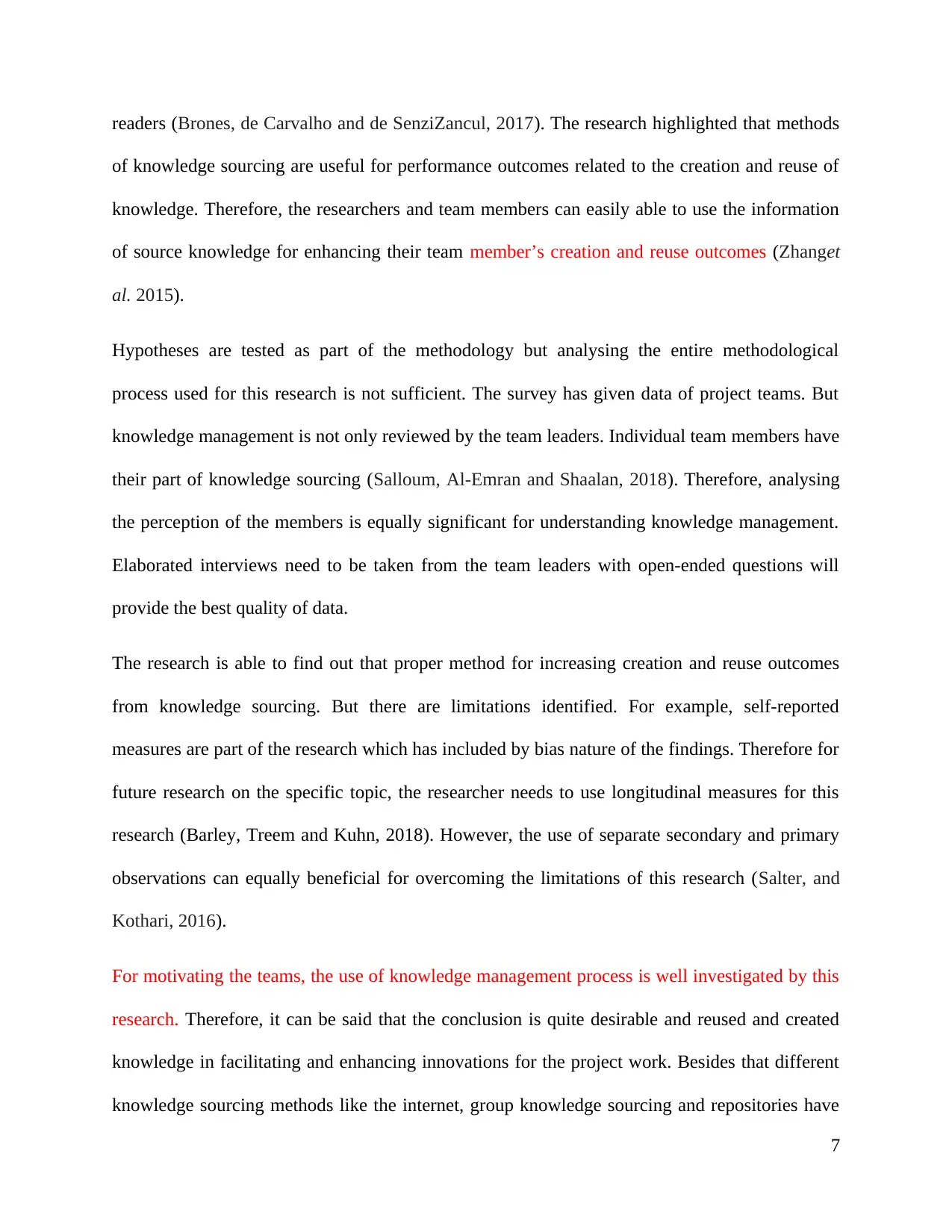
readers (Brones, de Carvalho and de SenziZancul, 2017). The research highlighted that methods
of knowledge sourcing are useful for performance outcomes related to the creation and reuse of
knowledge. Therefore, the researchers and team members can easily able to use the information
of source knowledge for enhancing their team member’s creation and reuse outcomes (Zhanget
al. 2015).
Hypotheses are tested as part of the methodology but analysing the entire methodological
process used for this research is not sufficient. The survey has given data of project teams. But
knowledge management is not only reviewed by the team leaders. Individual team members have
their part of knowledge sourcing (Salloum, Al-Emran and Shaalan, 2018). Therefore, analysing
the perception of the members is equally significant for understanding knowledge management.
Elaborated interviews need to be taken from the team leaders with open-ended questions will
provide the best quality of data.
The research is able to find out that proper method for increasing creation and reuse outcomes
from knowledge sourcing. But there are limitations identified. For example, self-reported
measures are part of the research which has included by bias nature of the findings. Therefore for
future research on the specific topic, the researcher needs to use longitudinal measures for this
research (Barley, Treem and Kuhn, 2018). However, the use of separate secondary and primary
observations can equally beneficial for overcoming the limitations of this research (Salter, and
Kothari, 2016).
For motivating the teams, the use of knowledge management process is well investigated by this
research. Therefore, it can be said that the conclusion is quite desirable and reused and created
knowledge in facilitating and enhancing innovations for the project work. Besides that different
knowledge sourcing methods like the internet, group knowledge sourcing and repositories have
7
of knowledge sourcing are useful for performance outcomes related to the creation and reuse of
knowledge. Therefore, the researchers and team members can easily able to use the information
of source knowledge for enhancing their team member’s creation and reuse outcomes (Zhanget
al. 2015).
Hypotheses are tested as part of the methodology but analysing the entire methodological
process used for this research is not sufficient. The survey has given data of project teams. But
knowledge management is not only reviewed by the team leaders. Individual team members have
their part of knowledge sourcing (Salloum, Al-Emran and Shaalan, 2018). Therefore, analysing
the perception of the members is equally significant for understanding knowledge management.
Elaborated interviews need to be taken from the team leaders with open-ended questions will
provide the best quality of data.
The research is able to find out that proper method for increasing creation and reuse outcomes
from knowledge sourcing. But there are limitations identified. For example, self-reported
measures are part of the research which has included by bias nature of the findings. Therefore for
future research on the specific topic, the researcher needs to use longitudinal measures for this
research (Barley, Treem and Kuhn, 2018). However, the use of separate secondary and primary
observations can equally beneficial for overcoming the limitations of this research (Salter, and
Kothari, 2016).
For motivating the teams, the use of knowledge management process is well investigated by this
research. Therefore, it can be said that the conclusion is quite desirable and reused and created
knowledge in facilitating and enhancing innovations for the project work. Besides that different
knowledge sourcing methods like the internet, group knowledge sourcing and repositories have
7
Paraphrase This Document
Need a fresh take? Get an instant paraphrase of this document with our AI Paraphraser
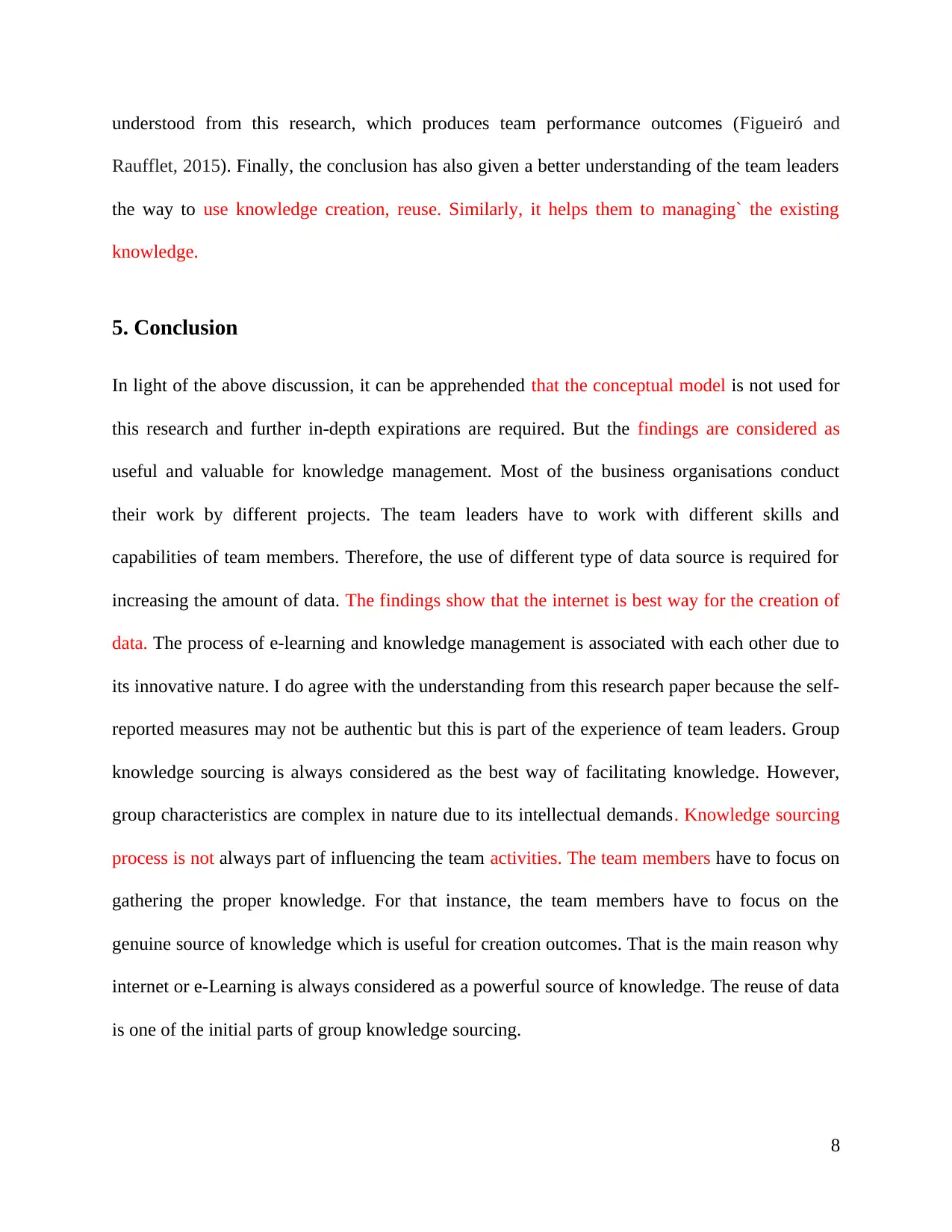
understood from this research, which produces team performance outcomes (Figueiró and
Raufflet, 2015). Finally, the conclusion has also given a better understanding of the team leaders
the way to use knowledge creation, reuse. Similarly, it helps them to managing` the existing
knowledge.
5. Conclusion
In light of the above discussion, it can be apprehended that the conceptual model is not used for
this research and further in-depth expirations are required. But the findings are considered as
useful and valuable for knowledge management. Most of the business organisations conduct
their work by different projects. The team leaders have to work with different skills and
capabilities of team members. Therefore, the use of different type of data source is required for
increasing the amount of data. The findings show that the internet is best way for the creation of
data. The process of e-learning and knowledge management is associated with each other due to
its innovative nature. I do agree with the understanding from this research paper because the self-
reported measures may not be authentic but this is part of the experience of team leaders. Group
knowledge sourcing is always considered as the best way of facilitating knowledge. However,
group characteristics are complex in nature due to its intellectual demands. Knowledge sourcing
process is not always part of influencing the team activities. The team members have to focus on
gathering the proper knowledge. For that instance, the team members have to focus on the
genuine source of knowledge which is useful for creation outcomes. That is the main reason why
internet or e-Learning is always considered as a powerful source of knowledge. The reuse of data
is one of the initial parts of group knowledge sourcing.
8
Raufflet, 2015). Finally, the conclusion has also given a better understanding of the team leaders
the way to use knowledge creation, reuse. Similarly, it helps them to managing` the existing
knowledge.
5. Conclusion
In light of the above discussion, it can be apprehended that the conceptual model is not used for
this research and further in-depth expirations are required. But the findings are considered as
useful and valuable for knowledge management. Most of the business organisations conduct
their work by different projects. The team leaders have to work with different skills and
capabilities of team members. Therefore, the use of different type of data source is required for
increasing the amount of data. The findings show that the internet is best way for the creation of
data. The process of e-learning and knowledge management is associated with each other due to
its innovative nature. I do agree with the understanding from this research paper because the self-
reported measures may not be authentic but this is part of the experience of team leaders. Group
knowledge sourcing is always considered as the best way of facilitating knowledge. However,
group characteristics are complex in nature due to its intellectual demands. Knowledge sourcing
process is not always part of influencing the team activities. The team members have to focus on
gathering the proper knowledge. For that instance, the team members have to focus on the
genuine source of knowledge which is useful for creation outcomes. That is the main reason why
internet or e-Learning is always considered as a powerful source of knowledge. The reuse of data
is one of the initial parts of group knowledge sourcing.
8
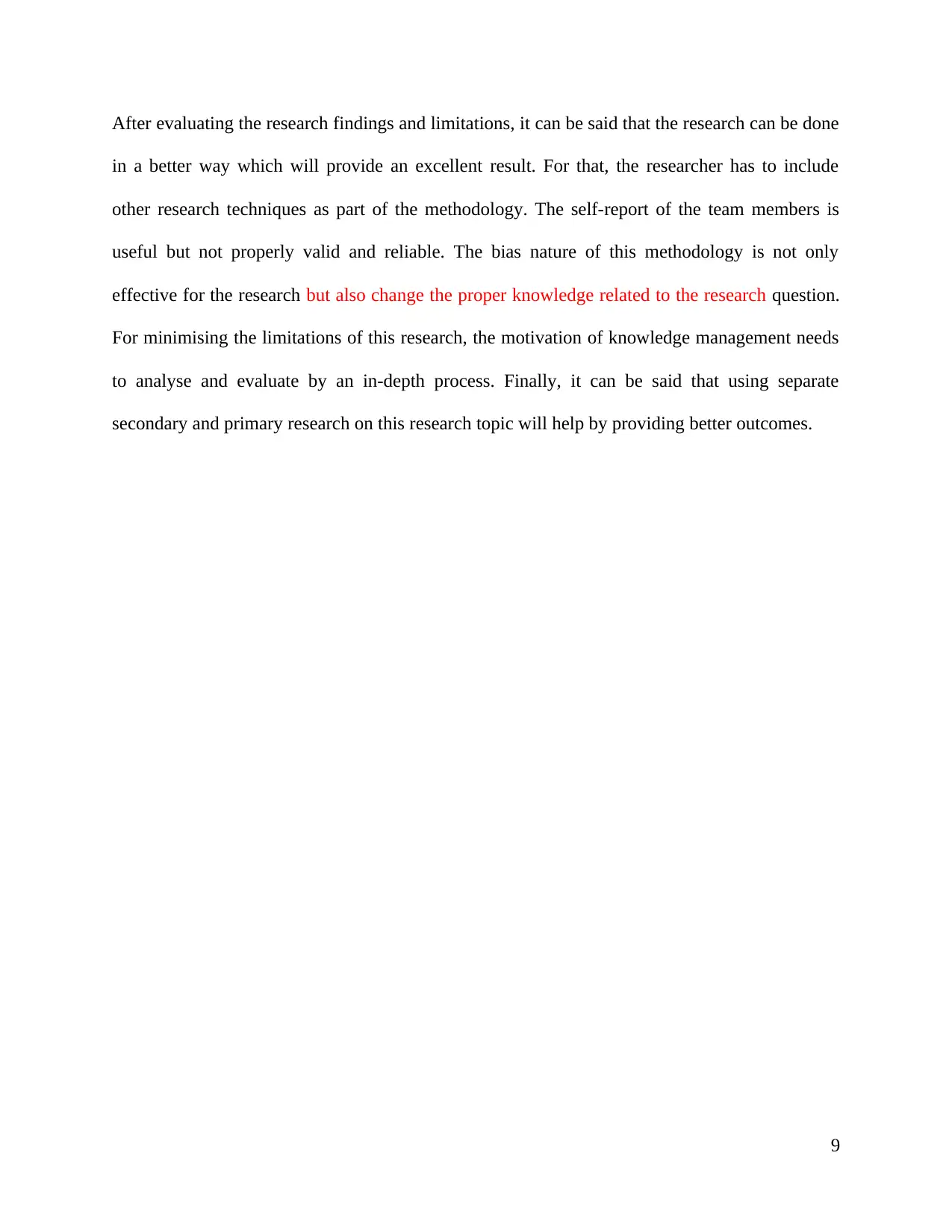
After evaluating the research findings and limitations, it can be said that the research can be done
in a better way which will provide an excellent result. For that, the researcher has to include
other research techniques as part of the methodology. The self-report of the team members is
useful but not properly valid and reliable. The bias nature of this methodology is not only
effective for the research but also change the proper knowledge related to the research question.
For minimising the limitations of this research, the motivation of knowledge management needs
to analyse and evaluate by an in-depth process. Finally, it can be said that using separate
secondary and primary research on this research topic will help by providing better outcomes.
9
in a better way which will provide an excellent result. For that, the researcher has to include
other research techniques as part of the methodology. The self-report of the team members is
useful but not properly valid and reliable. The bias nature of this methodology is not only
effective for the research but also change the proper knowledge related to the research question.
For minimising the limitations of this research, the motivation of knowledge management needs
to analyse and evaluate by an in-depth process. Finally, it can be said that using separate
secondary and primary research on this research topic will help by providing better outcomes.
9
⊘ This is a preview!⊘
Do you want full access?
Subscribe today to unlock all pages.

Trusted by 1+ million students worldwide
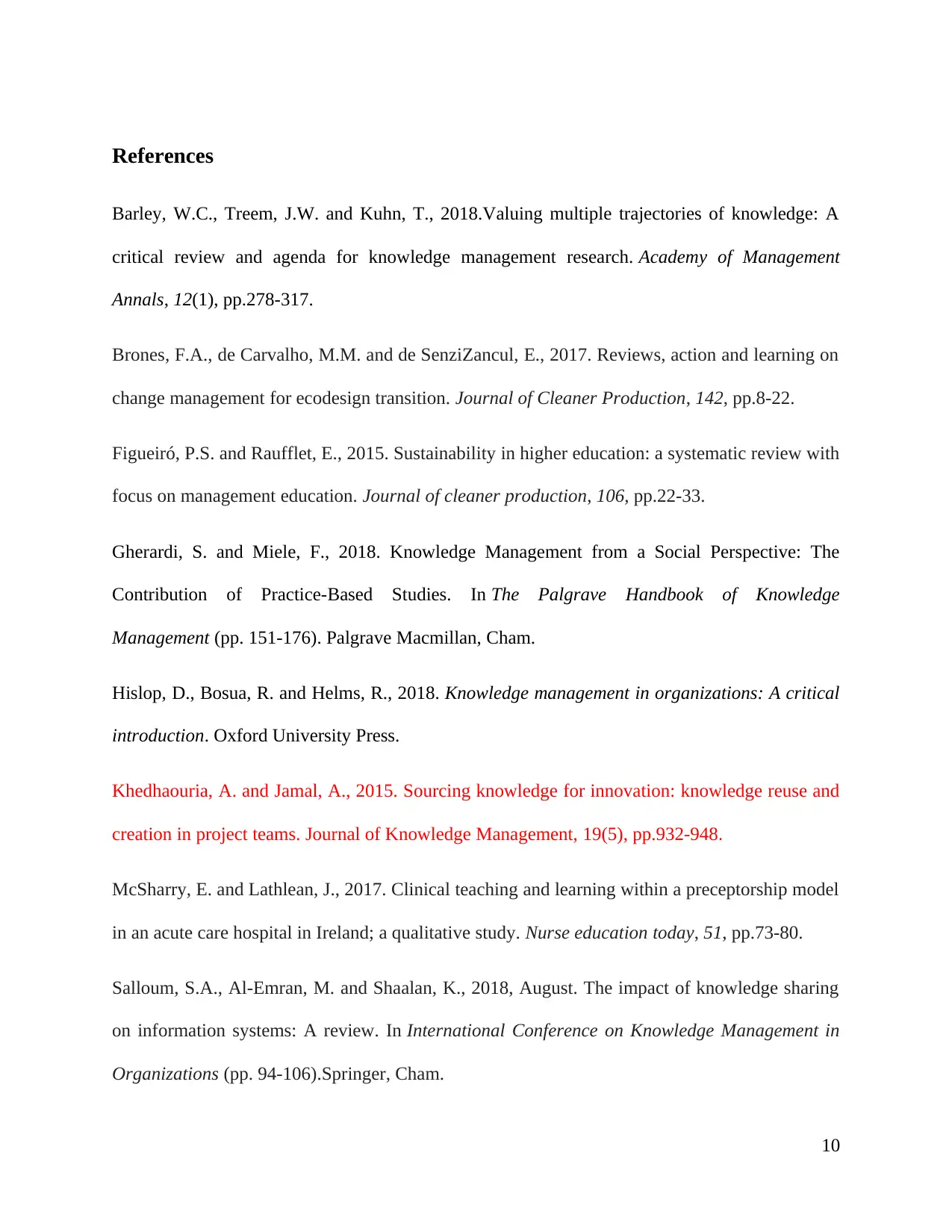
References
Barley, W.C., Treem, J.W. and Kuhn, T., 2018.Valuing multiple trajectories of knowledge: A
critical review and agenda for knowledge management research. Academy of Management
Annals, 12(1), pp.278-317.
Brones, F.A., de Carvalho, M.M. and de SenziZancul, E., 2017. Reviews, action and learning on
change management for ecodesign transition. Journal of Cleaner Production, 142, pp.8-22.
Figueiró, P.S. and Raufflet, E., 2015. Sustainability in higher education: a systematic review with
focus on management education. Journal of cleaner production, 106, pp.22-33.
Gherardi, S. and Miele, F., 2018. Knowledge Management from a Social Perspective: The
Contribution of Practice-Based Studies. In The Palgrave Handbook of Knowledge
Management (pp. 151-176). Palgrave Macmillan, Cham.
Hislop, D., Bosua, R. and Helms, R., 2018. Knowledge management in organizations: A critical
introduction. Oxford University Press.
Khedhaouria, A. and Jamal, A., 2015. Sourcing knowledge for innovation: knowledge reuse and
creation in project teams. Journal of Knowledge Management, 19(5), pp.932-948.
McSharry, E. and Lathlean, J., 2017. Clinical teaching and learning within a preceptorship model
in an acute care hospital in Ireland; a qualitative study. Nurse education today, 51, pp.73-80.
Salloum, S.A., Al-Emran, M. and Shaalan, K., 2018, August. The impact of knowledge sharing
on information systems: A review. In International Conference on Knowledge Management in
Organizations (pp. 94-106).Springer, Cham.
10
Barley, W.C., Treem, J.W. and Kuhn, T., 2018.Valuing multiple trajectories of knowledge: A
critical review and agenda for knowledge management research. Academy of Management
Annals, 12(1), pp.278-317.
Brones, F.A., de Carvalho, M.M. and de SenziZancul, E., 2017. Reviews, action and learning on
change management for ecodesign transition. Journal of Cleaner Production, 142, pp.8-22.
Figueiró, P.S. and Raufflet, E., 2015. Sustainability in higher education: a systematic review with
focus on management education. Journal of cleaner production, 106, pp.22-33.
Gherardi, S. and Miele, F., 2018. Knowledge Management from a Social Perspective: The
Contribution of Practice-Based Studies. In The Palgrave Handbook of Knowledge
Management (pp. 151-176). Palgrave Macmillan, Cham.
Hislop, D., Bosua, R. and Helms, R., 2018. Knowledge management in organizations: A critical
introduction. Oxford University Press.
Khedhaouria, A. and Jamal, A., 2015. Sourcing knowledge for innovation: knowledge reuse and
creation in project teams. Journal of Knowledge Management, 19(5), pp.932-948.
McSharry, E. and Lathlean, J., 2017. Clinical teaching and learning within a preceptorship model
in an acute care hospital in Ireland; a qualitative study. Nurse education today, 51, pp.73-80.
Salloum, S.A., Al-Emran, M. and Shaalan, K., 2018, August. The impact of knowledge sharing
on information systems: A review. In International Conference on Knowledge Management in
Organizations (pp. 94-106).Springer, Cham.
10
Paraphrase This Document
Need a fresh take? Get an instant paraphrase of this document with our AI Paraphraser
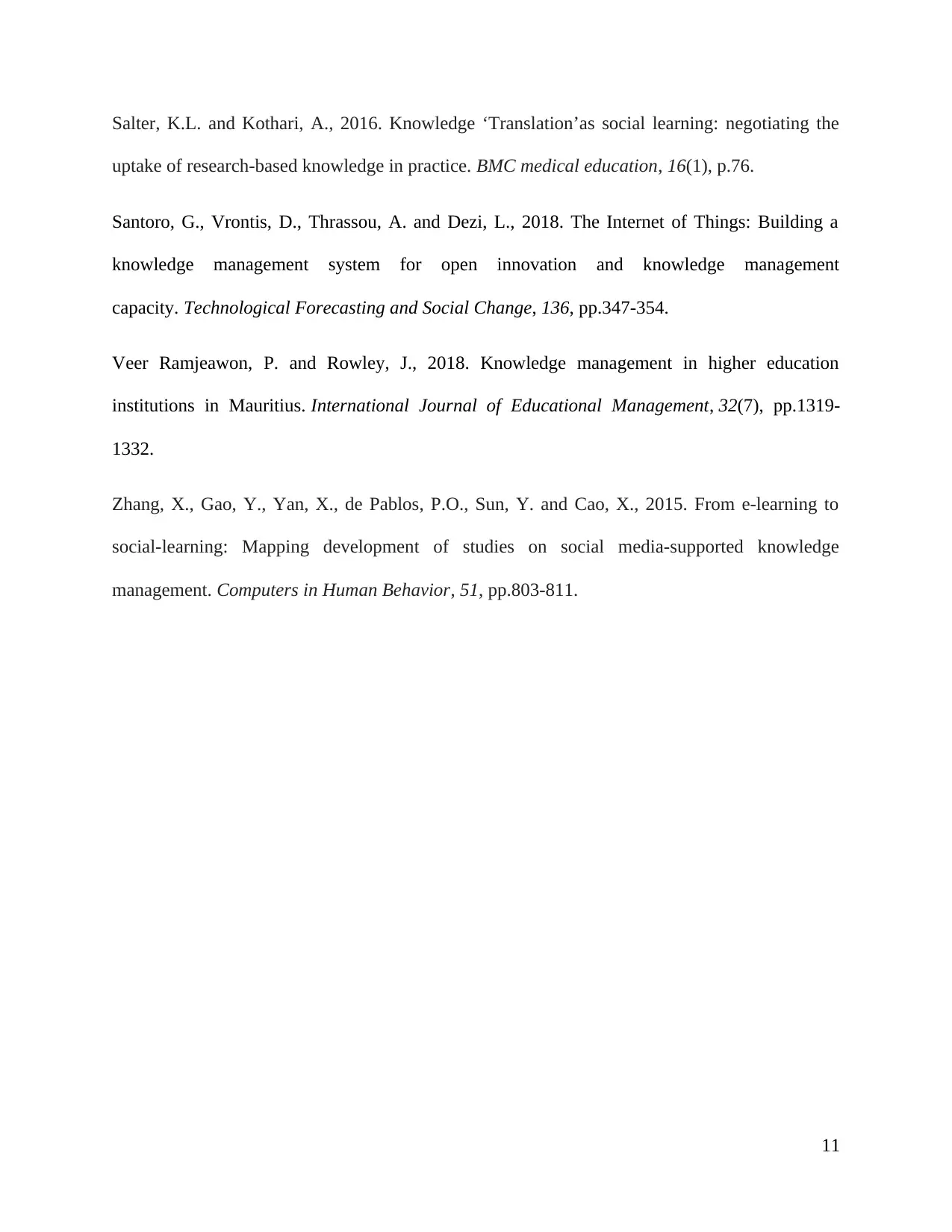
Salter, K.L. and Kothari, A., 2016. Knowledge ‘Translation’as social learning: negotiating the
uptake of research-based knowledge in practice. BMC medical education, 16(1), p.76.
Santoro, G., Vrontis, D., Thrassou, A. and Dezi, L., 2018. The Internet of Things: Building a
knowledge management system for open innovation and knowledge management
capacity. Technological Forecasting and Social Change, 136, pp.347-354.
Veer Ramjeawon, P. and Rowley, J., 2018. Knowledge management in higher education
institutions in Mauritius. International Journal of Educational Management, 32(7), pp.1319-
1332.
Zhang, X., Gao, Y., Yan, X., de Pablos, P.O., Sun, Y. and Cao, X., 2015. From e-learning to
social-learning: Mapping development of studies on social media-supported knowledge
management. Computers in Human Behavior, 51, pp.803-811.
11
uptake of research-based knowledge in practice. BMC medical education, 16(1), p.76.
Santoro, G., Vrontis, D., Thrassou, A. and Dezi, L., 2018. The Internet of Things: Building a
knowledge management system for open innovation and knowledge management
capacity. Technological Forecasting and Social Change, 136, pp.347-354.
Veer Ramjeawon, P. and Rowley, J., 2018. Knowledge management in higher education
institutions in Mauritius. International Journal of Educational Management, 32(7), pp.1319-
1332.
Zhang, X., Gao, Y., Yan, X., de Pablos, P.O., Sun, Y. and Cao, X., 2015. From e-learning to
social-learning: Mapping development of studies on social media-supported knowledge
management. Computers in Human Behavior, 51, pp.803-811.
11
1 out of 11
Related Documents
Your All-in-One AI-Powered Toolkit for Academic Success.
+13062052269
info@desklib.com
Available 24*7 on WhatsApp / Email
![[object Object]](/_next/static/media/star-bottom.7253800d.svg)
Unlock your academic potential
Copyright © 2020–2026 A2Z Services. All Rights Reserved. Developed and managed by ZUCOL.





